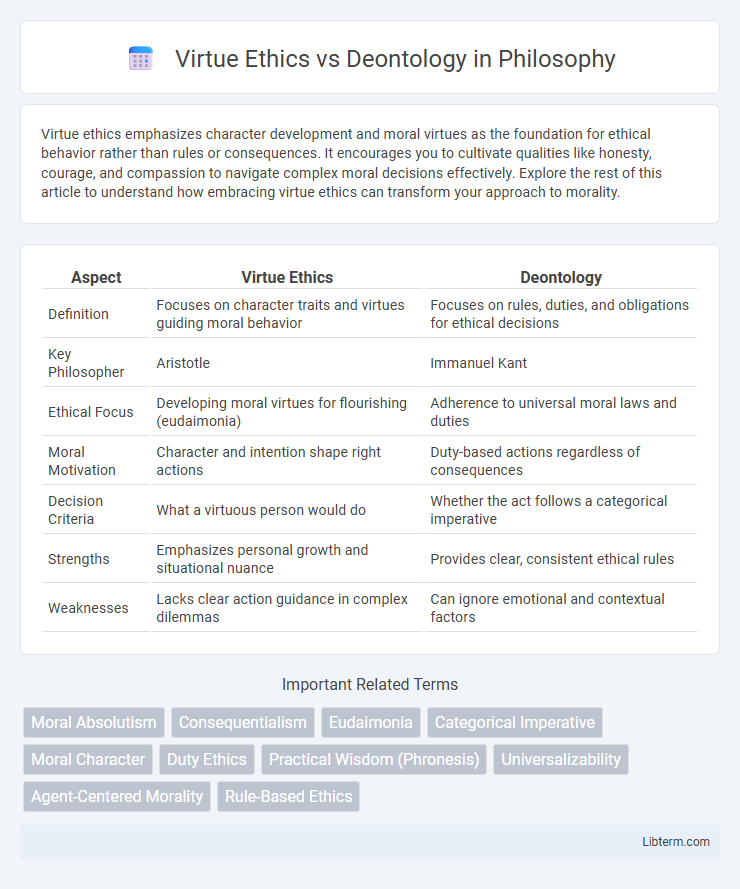Virtue ethics emphasizes character development and moral virtues as the foundation for ethical behavior rather than rules or consequences. It encourages you to cultivate qualities like honesty, courage, and compassion to navigate complex moral decisions effectively. Explore the rest of this article to understand how embracing virtue ethics can transform your approach to morality.
Table of Comparison
| Aspect | Virtue Ethics | Deontology |
|---|---|---|
| Definition | Focuses on character traits and virtues guiding moral behavior | Focuses on rules, duties, and obligations for ethical decisions |
| Key Philosopher | Aristotle | Immanuel Kant |
| Ethical Focus | Developing moral virtues for flourishing (eudaimonia) | Adherence to universal moral laws and duties |
| Moral Motivation | Character and intention shape right actions | Duty-based actions regardless of consequences |
| Decision Criteria | What a virtuous person would do | Whether the act follows a categorical imperative |
| Strengths | Emphasizes personal growth and situational nuance | Provides clear, consistent ethical rules |
| Weaknesses | Lacks clear action guidance in complex dilemmas | Can ignore emotional and contextual factors |
Introduction to Virtue Ethics and Deontology
Virtue Ethics emphasizes character traits and moral virtues, such as courage and honesty, as the foundation for ethical behavior, focusing on the development of a moral character over time. Deontology centers on adherence to moral duties and rules, asserting that actions are inherently right or wrong regardless of consequences, with philosophers like Immanuel Kant defining key principles. Both ethical frameworks provide distinct approaches to moral decision-making, highlighting character and intentions versus rule-based obligations.
Historical Background and Philosophical Roots
Virtue Ethics traces back to ancient Greek philosophers like Aristotle, emphasizing character traits and moral virtues as the foundation of ethical behavior. Deontology, rooted in the works of Immanuel Kant during the 18th century Enlightenment, centers on duty, rules, and the inherent morality of actions regardless of consequences. The historical divide highlights Virtue Ethics' focus on moral character development versus Deontology's emphasis on adherence to universal moral laws.
Core Principles of Virtue Ethics
Virtue ethics centers on character traits that cultivate moral excellence, emphasizing virtues like courage, honesty, and compassion as essential for ethical behavior. Unlike deontology, which focuses on adherence to rules and duties, virtue ethics prioritizes the development of moral character and the pursuit of eudaimonia, or human flourishing. Core principles include the habituation of virtuous actions and the cultivation of a balanced disposition through practical wisdom (phronesis).
Core Principles of Deontology
Deontology centers on the intrinsic morality of actions, emphasizing adherence to universal duties and rules regardless of outcomes. Key principles include the categorical imperative, which mandates acting only according to maxims that can be universally applied, and respect for persons, treating individuals as ends in themselves rather than means. This ethical framework contrasts with Virtue Ethics by prioritizing moral obligations over character traits or consequences.
Key Thinkers and Foundational Texts
Aristotle's Nicomachean Ethics is the foundational text for virtue ethics, emphasizing character development and moral virtues as key to ethical behavior. Immanuel Kant's Groundwork of the Metaphysics of Morals establishes deontology, focusing on duty and universal moral laws dictated by reason. Both frameworks pivot on distinct approaches: virtue ethics centers on moral character and the cultivation of virtues, while deontology prioritizes adherence to moral duties and rules.
Moral Decision-Making: Character vs. Rules
Virtue ethics emphasizes moral decision-making based on character traits such as honesty, courage, and compassion, promoting the development of virtuous habits over time. Deontology prioritizes adherence to moral rules and duties, asserting that actions are inherently right or wrong regardless of consequences. The core distinction lies in evaluating moral actions through the lens of an individual's character versus objective, universal principles guiding behavior.
Strengths and Weaknesses of Virtue Ethics
Virtue ethics emphasizes character development and moral virtues, promoting holistic personal growth and practical wisdom for ethical decision-making. It strengths lie in its flexibility and focus on moral character rather than rigid rules, allowing adaptation to complex, real-life situations. However, its weaknesses include ambiguity in defining virtues and challenges in resolving conflicts between competing virtues without clear guidelines.
Strengths and Weaknesses of Deontology
Deontology's strength lies in its clear, rule-based framework that provides consistent moral guidance by emphasizing duties and obligations over consequences. However, its rigidity can lead to conflicts between duties and difficulty in addressing complex ethical dilemmas where rules may clash. Critics argue that deontology sometimes ignores the context and outcomes, potentially resulting in morally questionable decisions despite adherence to rules.
Practical Applications and Real-World Examples
Virtue ethics emphasizes developing moral character traits such as honesty and courage, guiding individuals to act virtuously in professions like medicine and law by prioritizing compassion and integrity. Deontology focuses on following universal moral duties and rules, exemplified in legal systems where adherence to laws and ethical codes ensures justice and fairness. In real-world scenarios, virtue ethics shapes personal decision-making through character formation, while deontology provides clear frameworks for evaluating right and wrong actions based on established principles.
Contemporary Debates and Future Directions
Contemporary debates in Virtue Ethics vs Deontology focus on balancing character-based moral evaluation with rule-based ethical frameworks. Scholars explore integrating virtues within deontological principles to address complex issues like AI ethics and bioethics. Future directions emphasize interdisciplinary approaches, combining psychological insights on moral development with normative ethical theories for more adaptive decision-making models.
Virtue Ethics Infographic

 libterm.com
libterm.com